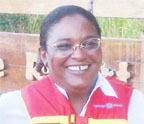There is probably some measure of validity to the point made by President Bharrat Jagdeo that the current travails of Guyanese residing illegally in Barbados may well have a great deal to do with a measure of earned eye pass arising from the fact that many of us are inclined to run down our own country to ‘outsiders.’ That, however, is very much a parochial point, which, we assume, was not intended to become part of the President’s substantive approach to tackling the issue, that issue being the customary coarse treatment of Guyanese travelling to and living in Barbados by our Caricom brothers and sisters and now, the ignominy of wholesale eviction from their island.
And while no one wants to see this issue blown of proportion, surely, we have now arrived at a place where we need to draw a line in the sand and let the Bajans know just how affronted we feel about the quality of their hospitality.

If the demand by the Thompson Administration that Guyanese living in Barbados seek to regularize themselves or leave has been sufficiently sudden to cause us to ponder the motive, we are, also, entitled to the view that the Barbados Prime Minister’s assurances given to President Jagdeo that, in the course of that ‘regularization’ and ‘eviction’ exercise, the treatment of Guyanese would be attended by a degree of dignity and decorum was, arguably, a deliberate attempt to pull the wool over the President’s eyes. There have simply been too many reports of late night and early morning knocks on doors and instances of the kind of treatment that is not acceptable among people claiming to be “a Caribbean community” for Prime Minister Thompson not to have had at least some inkling as to how that ‘regularization and eviction’ process was playing out on the ground.
What the Barbadian authorities clearly recongise and what they have exploited for many, many years is their awareness that Guyana has, all along, been playing this particular game with a horribly weak hand. There are Guyanese living in Barbados, illegally, considerably large numbers of Guyanese; they are there because they believe that Mr Thompson’s country can do better by them than can their own. The point about this is not whether their belief is true or otherwise but that the belief exists anyway and that Guyanese are neither afraid nor ashamed to express that belief. When, for reasons justified or otherwise, people find cause to run down their own country and to seek to live elsewhere and when so many of those who remain here accept as an axiom that their relatives and friends living outside Guyana are decidedly better off, external perceptions of our country can hardly be expected to be anything but dismal. The whole sorry tale goes back to the days of food shortages and the attendant queues for basic items and the ridiculous currency exchange rates and suitcase trading and still, well nigh two decades later, the longing to leave persists. It is these phenomena that have provided the Bajans with the leverage to impose their humiliating airport interrogations, to send some of us packing on the next flight heading our way and to leave those lucky enough to slip through the airport net to take their chances in what for many has been a discomfiting environment.

But that is not the whole story. Perhaps the more pertinent part of the story has to do with the fact that some, many of our countrymen and women perceive the situation in Guyana as being suh baad that they are prepared to tek deh chances – unacceptable chances, at that- in order to live elsewhere; inevitably, they point fingers at those who have, over the years, had responsibility for the political management of our country; and those who have governed must contemplate their own failure to make things right, to create the conditions – social, economic, political et al – that would have caused at least some of those Guyanese who have located themselves in Barbados and elsewhere and who, in many instances, have had to endure those humiliating experiences and unpalatable conditions, to want to remain at home. So that while President Jagdeo is perfectly at liberty to make the point about the role that we ourselves have played in the creation of negative external perceptions of Guyana by running down our country, there is really no less validity to the view that it is the political running down – the political malnourishment, if you will – of our country that has, perhaps more than anything else, contributed to the continually swelling ranks of the Guyanese diaspora.
Whatever our political leaders have done, think they have done, say they have done or say they will do, the fact of the matter is that large numbers of our people still take considerable risks and endure circumstances that are sometimes difficult in the extreme to get out. That is unquestionably a failure that can be placed nowhere else but at the feet of those who have governed our country; and the Bajans understand these things.

If the truth be told the treatment of our people in Barbados has much to do with the fact that some, not all but some of them, are seen as economic and/or political refugees and that is why the Barbadians are inclined to make the altogether demeaning remark that our people place a strain on the social services. Place a strain on social services my grandfather’s glass eye! If there is one thing that can be said about Guyanese it is that wherever we go we are almost always prepared to work hard to earn our livelihoods.
I know of a Guyanese building contractor, who, having traveled to Barbados and having been subjected to the customary shabby immigration treatment reserved for arriving Guyanese, curtly told the offending Immigration Officer that he was there to build houses for Barbadians because they did not have the skills to build those houses for themselves. That may have been an exaggeration but the truth is that the success of the Bajan construction industry is due in large measure to that country’s importation of Guyanese expertise. In other ways too the Bajans are indebted to us. Just last year, the former Barbados Prime Minister Mia Mottley acknowledged to an audience here in Georgetown that the Barbados business sector was, to a considerable extent, built on the pioneering entrepreneurship of Guyanese migrants.
Some weeks ago I wrote in another medium about a group of foreigners who were bargaining energetically with a Bourda Market vendor over the purchase of a consignment of tomatoes which, at the time, were being offered on the local market at about thirty US US$0.30 per pound. I remember that the vendor, feeling perhaps that a point was being reached where she felt that the visitors were getting the better of the exchange declared “all yuh Bajans never had it suh good, eh!”
There are other episodes in our history too, ones that are best addressed by our historians, that have to do with Guyana’s accommodation of Barbadians and other Caribbean people, who, whatever strain they may or may not have placed on our own social services in those days, were, in the customary Guyanese fashion, treated like our own.
The problem of poor treatment of Guyanese in Barbados is nothing new neither is it a matter of the strict and professional enforcement of an immigration policy. It is a planned and sustained regimen of harassment and humiliation that takes no account of the feelings of our people. It is a way of thumbing their noses at who they perceive us to be.
I have always felt that there is a soft underbelly to our own foreign policy that has to do with who we really are as a people. It is a ‘softness’ that restrains our response. I have never believed for a single moment that, as some Barbadians have sought to suggest, the treatment of Guyanese at the Grantley Adams Airport has to do solely with the “attitude” of the immigration officials. I believe that the treatment is really a matter of policy, which, understandably, no Barbadian official is ever likely to concede and that it has to do with, among other things, a sense of local insecurity driven by anxieties over perceptions of what sustained waves of Guyanese immigrants might mean for native Barbadians. The ‘softness’ of our foreign policy on this matter may also have to do with our official feelings of guilt, given the popular argument that the whole affair stems from our inability to create conditions that will keep our people at home. After all, the Guyanese victims of the Bajan immigration crackdown and their government, the Guyana Government, that is, are by no means soul mates. Witness, for example, the fact that some of the unfortunates have expressed a preference for continuing to duck and dive in Barbados rather than return home. In those circumstances it becomes pretty awkward to jump to the defence of people who appear to want neither your pity nor your help. This is part of the weak hand with which the authorities here are playing.
There is a school of thought that says that even allowing for the likelihood that the authorities in Bridgetown may have become afflicted with a bad case of immigration anxiety that may have to do with concerns over the current global economic and financial crisis, the way in which the whole affair has been handled causes us to believe less rather than more in the tenets of the Caribbean Community and to embrace more closely the oft expressed view that it requires much more than geographic proximity and a measure of shared history to create a genuine community of people. The sad part of this is that the treatment of Guyanese in Barbados has inclined a larger number of people than we think to the view that notions like free movement of skills, hassle free travel and a regional single market and economy are really no more than pipe dreams and that it really is true, after all, that as far as what we call the Caribbean Community is concerned, the national will to survive supercedes the regional will to succeed.
But we cannot afford to allow ourselves to “buy into” that notion nor can we – however much we are often sorely tempted – yield to the advocacy of a growing number of Guyanese at home that, in whatever ways we can, we simply find ways of reciprocating the ‘hospitality’ to which our nationals are subjected in Barbados, in other words that we do dem back. After all, so the argument goes, President Jagdeo -as appears to be the case with Prime Minister Thompson – can always, conveniently, not be aware of the manner in which the immigration officers at the Cheddi Jagan International Airport, Timehri go about ‘the application of our immigration policy;’ and any inadvertent mistreatment of Barbadians traveling to Georgetown can always be followed quickly by what the diplomats customarily describe as “profound expressions of regret.”
Some of us would say, of course, that that would be the wrong thing to do, that it would harm regional integration which is, now more than ever before, widely considered to be a critical catalyst for the economic advancement of Caricom member countries; and at any rate we as Guyanese have simply not been able to muster the requisite nationalistic outrage, the sheer bloody-mindedness to do the Bajans back.
Its tough though; tough to persuade our people to continue to believe in notions like a community of Caribbean people and hassle free travel and a single economic space, notions with which we are being continually bombarded by our politicians, when the evidence on the ground suggests that nothing may be further from the truth. Its tough too to believe that even as the Bajans are asserting an immigration policy that appears to single out Guyanese people for ‘special treatment,’ we in Guyana continue to contemplate a regional food policy from which Barbados – one of the more vulnerable countries in the region to any global food crisis – is likely to benefit; and if, as we expect, indeed we hope, Prime Minister Thompson and his delegation find their way to Georgetown for the July Caricom Heads Of Government meeting, we are gully entitled to expect that our own leaders will give them what the English term ‘an earful’ about just how we feel about the treatment of Guyanese in Barbados by our erstwhile “Caricom brothers and sisters.’ We should not spare their feelings.
Arnon Adams
